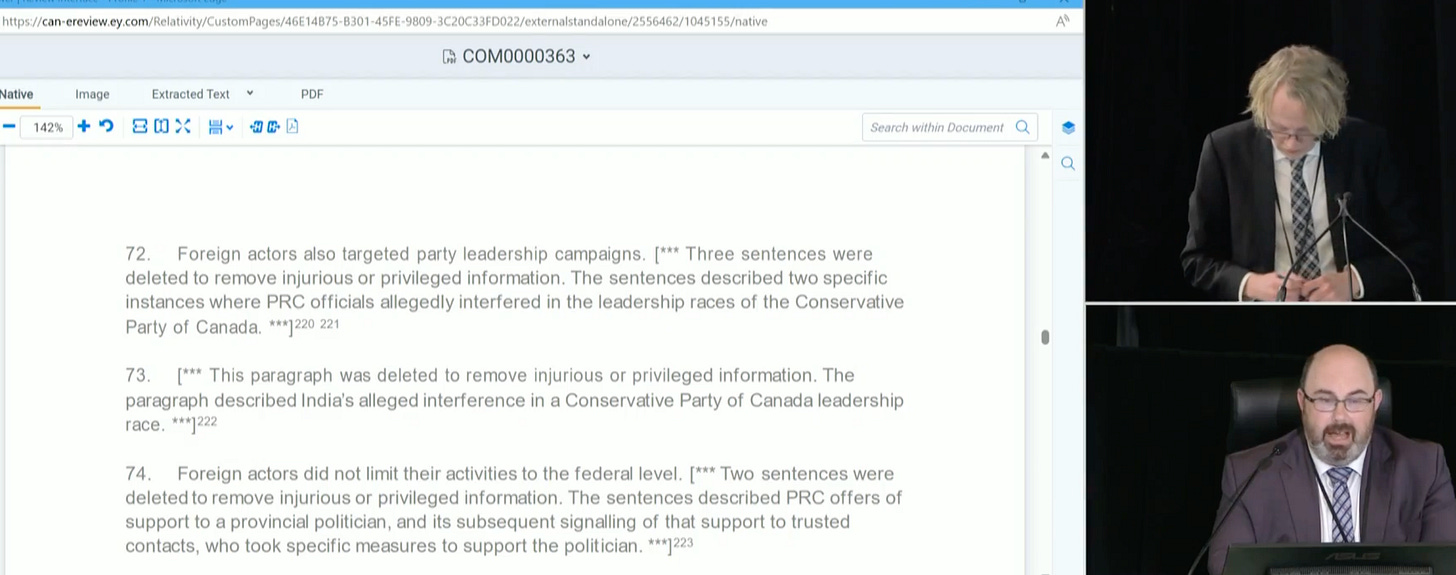Party boss claims no awareness of intel that "PRC officials allegedly interfered in the leadership races of Conservative Party of Canada"
Party memberships paid by foreign states + non-citizens nominating candidates in 'safe ridings': Hogue Commission
In an examination of officials from Canada’s two major political parties today, the Hogue Commission is probing the alarming weaknesses in Canada's election system, where non-citizens living in Canada but working for hostile states are exploiting loopholes in political party nomination processes and even leadership contests, and where parties apparently give no guidance to their MPs on hiring staff or interacting with foreign diplomats, according to intelligence reports and testimony.
China’s election interference networks, led by Beijing’s United Front and intelligence agents, establish collusion between Chinese Consulate officials, political candidates and their staff, and community leaders to clandestinely support politicians sympathetic to the Chinese Communist Party. Previous intelligence reporting obtained by The Bureau from confidential sources identified these activities and revealed a broader manipulation of Canada’s political party nomination processes.
The Bureau’s exclusive reporting was confirmed by documents tabled Friday, which underscore a critical vulnerability: Canada’s political party nomination processes are not regulated by federal or provincial election laws. As a result, foreign agents are able to manipulate these processes with relative ease. Unlike formal elections, where some rules and oversight exist, party nomination processes rely on internal regulations that can be exploited by hostile states and their proxies.
"Each political party sets and enforces its own rules, and party members can vote in nomination races, regardless of their legal status in Canada,” the documents say. “For example, individuals who are not Canadian citizens—and therefore cannot vote in elections at any level of government in Canada—can still vote in a party nomination process as long as they are party members. In some instances, the membership fee is paid for, or reimbursed by, a hostile state actor or its proxies."
In his testimony to the Commission, Conservative official Mike Crase was asked specifically whether the Conservative Party offers MPs any resources or guidance on vulnerabilities believed to relate mostly to United Front election interference networks operating intensively in Vancouver and Toronto, according to previous hearing evidence.
A Commission lawyer asked, “In terms of guidance or resources regarding an MP’s conduct with foreign diplomats, does the party give any guidance or resources to MPs on that?”
“On that topic? No, I haven't been a part of any of that,” he said. Crase also confirmed the party offers no top-down guidance for MPs to vet and hire their staff, suggesting crucial vulnerabilities to Beijing’s United Front networks in Canada.
In a later exchange, Crase was questioned about allegations raised in the bombshell NSICOP 2024 report, which suggested the Conservative Party’s leadership contests were targeted by hostile states.
The redacted version tabled Friday says:
“Foreign actors also targeted party leadership campaigns. [Three sentences were deleted to remove injurious or privileged information. The sentences described two specific instances where PRC officials allegedly interfered in the leadership races of the Conservative Party of Canada.”
"Is the party aware of allegations that the CPC leadership races were targeted for foreign interference attempts in the last two leadership contests?" a lawyer probed.
“I was not the executive director at the time, or a party employee, for either of the leadership races that you’ve spoken about there,” Crase said. “So, I don’t have any specific information beyond, um, two very brief paragraphs in the NSICOP report, that touched on it."
"Does the party have any information regarding that?" the Commission lawyer pressed.
"No, no one has, to my knowledge, ever approached us with any kind of detail,” he said, adding, “the party is very comfortable with the systems we have in place to administer our leadership races."
Earlier this week, in explosive testimony, former Conservative leader Erin O’Toole raised concerns that a Conservative Senator was allegedly lobbying for a Chinese state-owned enterprise in a Canadian municipality, raising further questions about potential clandestine activity.
O’Toole testified that, as leader, he lacked support and guidance from Canadian intelligence agencies to verify the allegations he was hearing about a senior party member, which included the Senator’s meetings with Chinese officials during trips to China.
The Bureau has learned from political sources the identity of the Ontario-based politician O'Toole was concerned with. A classified intelligence source also alleged that the politician O’Toole’s team was investigating had been assessed by CSIS as a significant actor in a United Front Work Department election interference network in Toronto. This network allegedly implicated at least 11 federal candidates and 13 campaign staff in the 2019 election, including both Liberal and Conservative politicians.
These developments may fit into the broader vulnerabilities described in documents examined Friday. These documents reveal that the interactions between Canadian Parliamentarians and foreign actors raise serious concerns about how foreign influence is leveraging relationships within Canada's political system.




